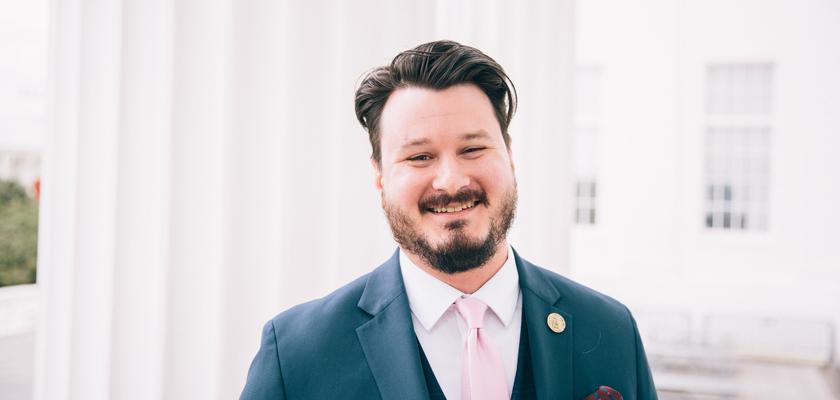They told me when I was young,
Something I can't quite recall,
But I know by the ways they cared
Nothing need be said at all
Can you put in words your wide world
Leaving no memory obscured?
Could you surmise your love for boy or girl
And consider your insatiability cured?
Dad told me many stories
Mom sang me the songs she was sung
The adventures and melodies live within me,
Though, for now, their words escape my tongue
I can't spell out the past
My youth being lived, not read
But just like an unsung memory
Our pasts live in every moment unsaid
The world is an unbroken thing
Flowing through each to each
Persons, moments, and places unspoken
A visceral knowledge we cannot teach
If a society grounded in ordered liberty is to be sustained, it must also be based on a humble uncertainty about the course of human history. Rather than jumping from beginning to end, the living story of man’s onward and upward emancipation is constantly being written as a balancing act between the book covers.
As the Scottish sociologist and historian Adam Ferguson once remarked, “Every step and every movement of the multitude, even in what are termed enlightened ages, are made with equal blindness to the future; and nations stumble upon establishments, which are indeed the result of human action, but not the execution of any human design.”
Societies may rise or fall in their own unique way, but no matter the civilization in question, man is always at war with the austerity of nature. Though nature can be considered an eternal mother who grants us our borrowed time here on earth, she can also be suspected of vengeance. Much like Euripides’ Medea, mother nature does not hesitate to slaughter her children to prove her independence, especially if she has been scorned. We come from nature and we will return to her. As it says in Genesis 3:19, “By the sweat of your brow you will eat your food until you return to the ground, since from it you were taken; for dust you are and to dust you will return.”
Left solely to nature, our time truly does seem to be borrowed; our lives meaningless, fragmented, nasty, brutish, and short; our deaths inescapable. Thus, in the face of this tragic state, we interlace our mortal coils with poetry, myth, and faith. In so doing, the most important things in our lives become the stories we receive, weave, and leave across the generations.
Our deepest held convictions are first found in the fabric of our good-faith fictions.
Most of us, individually, ponder the story of how we began, how we will end, and what’s the purpose of it all, but rare (and foolish!) is the person who tries to stomach the mysteries of existence solely on his own. Indeed, society is required to serve as a shelter against our tragic nature, bringing our fragmented individual knowledge together into a spontaneous, dynamic, and fortuitous collective order that is the product of human action but not human design. But, society’s shelter is not what makes an individual’s spirit — just as a house does not make a home.
Imagine you are peering down at the world from 10,000 ft. From such a tall perch, society can seem to take on a life of its own. The temptation is ripe, from such a lofty height, to project the Logos onto society itself while forgetting it is the birthright and duty of each individual person to seek the true, beautiful, and good himself. Rather than contemplating our own individual lives and the dynamics between us, we begin to speculate on the trajectory of History itself regardless of individual human action. Our faith becomes hubris, as we begin to regard such speculations as destiny and scorn mother nature in search of a new bride of our own creation. It is one thing to battle nature step by step, but to supplant her completely in one great leap? Such is the epitome of the proverb, "pride goes before destruction, a haughty spirit before a fall.”
When successful societies forget their foundations are basically volatile fictions — best guesses prone to the tumult and tyranny (especially in the political realm) — they run the risk of taking their own self-serving destiny too seriously and become subject to the backlash of Mother Nature’s vengeance and God the Father’s wrath.
Thus, the task before us is to come to grips with the fact that wrestling with humanity’s role in the cosmos is a creative act. Why not see our musings on the course of history — whether they be visions of progress, decline, cyclical revolutions, or the fulfillment of some design — as good faith fictions that touch the truth without smothering the continued search for truth in all the inherited stories and mysteries of life?
As the song says:
Everybody's looking 4 the answers
How the story started and how it will end
What's the use in half a story, half a dream
U have 2 climb all of the steps in between
Rather than pondering the state of nature or some far-off utopia, I hope we will instead “climb all the steps in between'' on the ladder of life, ascending into the beautiful unknown with a humble yet enduring faith in man’s history and his future freedom in the cosmos.
Joey Clark is a native Alabamian and currently, the host of the radio program News and Views on News Talk 93.1 FM WACV out of Montgomery, AL M-F 9 am-12 noon. His column appears every Tuesday in 1819 News. To contact Joey for media or speaking appearances as well as any feedback please email newsandviews931@gmail.com. The views and opinions expressed here are those of the author and do not necessarily reflect the policy or position of 1819 News. To comment, please send an email with your name and contact information to Commentary@1819news.com.










